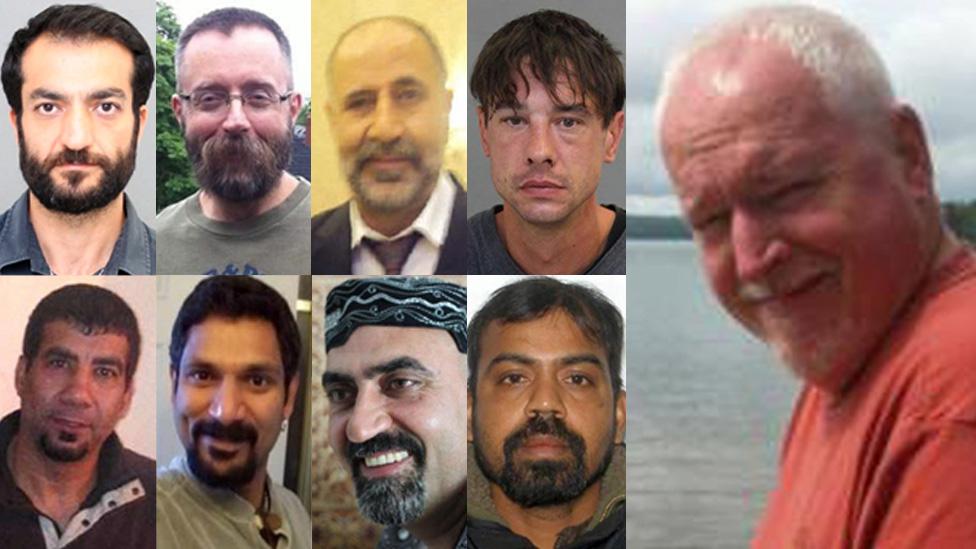Bruce McArthur: Gay village serial killer gets life sentence
- Published
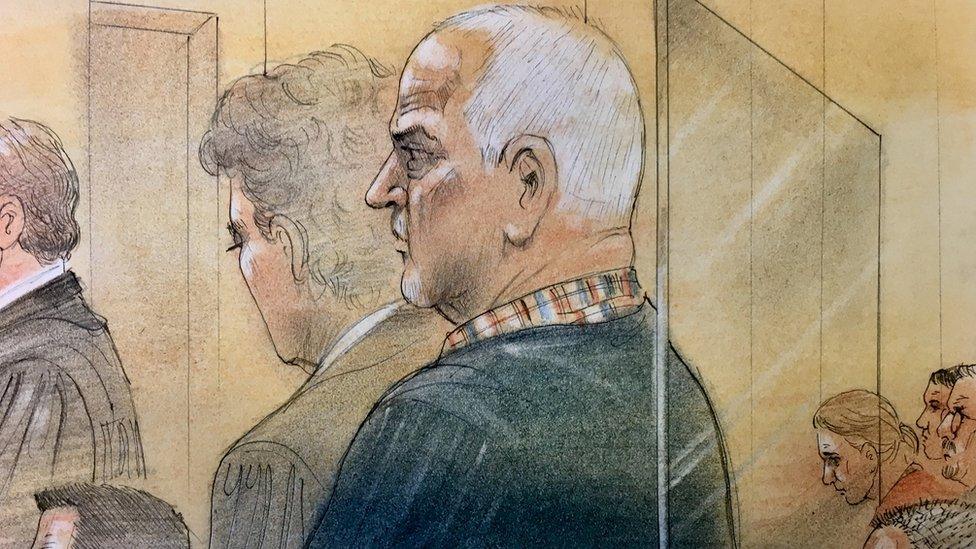
Bruce McArthur pleaded guilty to eight counts of first-degree murder
Canadian serial killer Bruce McArthur has been handed a life sentence for the murder of eight men.
The 67-year-old has been given eight concurrent life sentences, and will not be eligible for parole for 25 years.
McArthur stood impassively in a red plaid shirt and grey jumper while the sentence was handed down on Friday.
He had pleaded guilty to eight counts of first-degree murder for the brutal killings of eight men - some of them close friends.
As each count carried a mandatory life sentence without parole for 25 years, the only decision before Justice John McMahon has been whether to sentence him concurrently or consecutively.
McArthur will not be eligible for parole before he is 91.
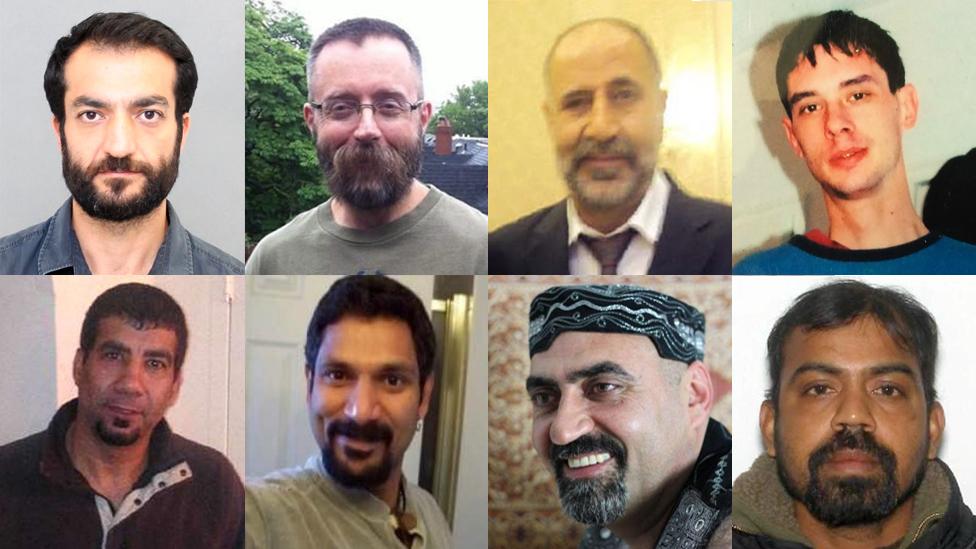
Clockwise from upper left: Selim Esen, Andrew Kinsman, Majeed Kayhan, Dean Lisowick, Kirushna Kumar Kanagaratnam, Abdulbasir Faizi, Skandaraj Navaratnam, Soroush Mahmudi
Most of his victims had ties to Toronto's Gay Village neighbourhood, as did McArthur himself.
They were Selim Esen, Andrew Kinsman, Majeed Kayhan, Dean Lisowick, Kirushna Kumar Kanagaratnam, Abdulbasir Faizi, Skandaraj Navaratnam and Soroush Mahmudi.
Justice McMahon called the crimes "pure evil".
He especially condemned McArthur's exploitation of his victims' vulnerabilities.
Two of the men were periodically homeless and struggled with addiction; one was a refugee who was about to be deported; several were married men, who had not revealed their sexuality to their families.
But if McArthur believed they would go unmissed, he miscalculated.
"Dean was a loving and caring man," his uncle wrote the court. "He was not alone in this world."
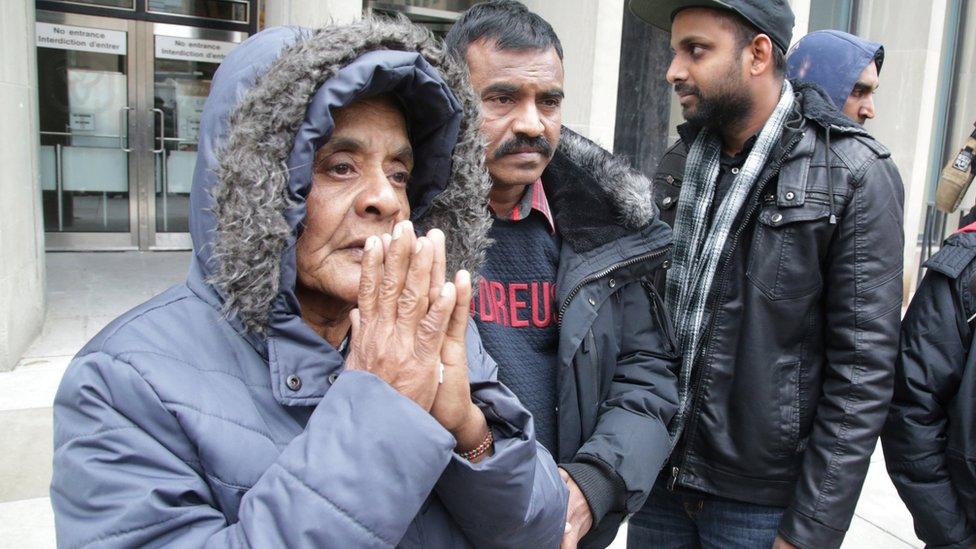
The mother of Kirushna Kanagaratnam, reacts outside the courtroom after her son's killer Bruce McArthur is sentenced to life in prison
Lisowick, who struggled with mental health problems and addiction, had been homeless and was discharged from a shelter the day McArthur killed him.
"With proper treatment, Dean's life could have been turned around but that opportunity has been taken away from him."
His cousin, Julie Pearo, spoke about how her love for Dean has eclipsed her "hatred and anger" at McArthur.
"My love for Dean, my grief in his absence, the movie reels of memories in my head... take up all the space in my heart and my thoughts," she said through tears in court.
Others relatives expressed rage at McArthur.
Umme Farzook, who reported her husband Soroush Mahmudi missing, still calls him her "soul mate".
Since learning of his murder, she says she suffers from PTSD and has been unable to work.
She sobbed while prosecutor Craig Harper read her statement aloud to the court.
"My pain and suffering will always be there as long as I live," she wrote. "And I will constantly be reminded of how my beloved and innocent husband was brutally murdered."
Pending police review
After giving his reasons for the sentence, Justice McMahon took the unusual step of addressing the court. He thanked both the prosecution and the defence, noting "it is not easy to defend a serial killer".
He also took the time to commend the police investigation that brought McArthur to justice, a pointed statement at a time that the police department is under scrutiny for how it handled the early stages of the investigations into some of the victims.
"I make no comment nor do I know the facts of what transpired in earlier investigations," Justice McMahon told court, addressing the lead investigators.
"I am convinced because of your team's work you not only brought McArthur to justice... you saved the life of a man referred to as John."
McArthur had been in the middle of restraining a potential ninth victim identified as "John" when police arrested him.
There is currently an independent review of how police treat missing persons cases, after outcry over how McArthur was able to kill undetected for seven years.
Most of his victims were homeless, recent immigrants, or people of Middle Eastern or South Asian decent.
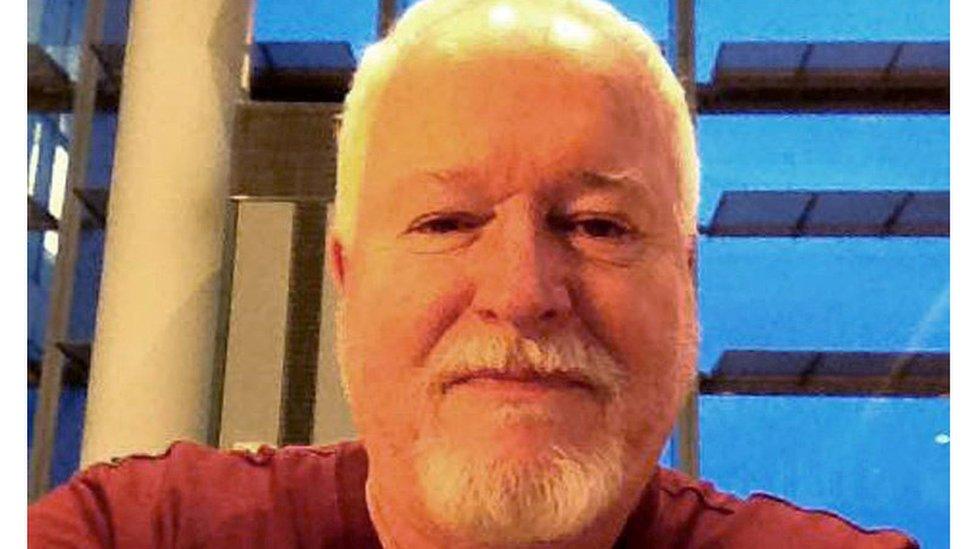
Bruce McArthur
It was not until McArthur killed Andrew Kinsman, a man well-known in the community, that police were able to hone in on a suspect.
Two police investigations into the missing men returned no leads, even though McArthur's name came up during one investigation, and he was as a witness (not a suspect) during the later one.
He also had a run-in with police in 2016, when he choked another man, who escaped.
The police officer who decided not to charge him is now facing a hearing into professional misconduct.
- Published4 February 2019

- Published29 January 2019
